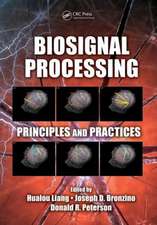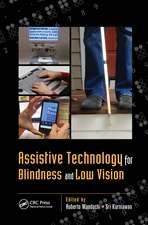Brain-Computer Interfaces: An international assessment of research and development trends
Autor Theodore W. Berger, John K. Chapin, Greg A. Gerhardt, Dennis J. Mcfarland, Jose C. Principe, Walid V. Soussou, Dawn M. Taylor, Patrick A. Trescoen Limba Engleză Hardback – 19 sep 2008
| Toate formatele și edițiile | Preț | Express |
|---|---|---|
| Paperback (1) | 717.20 lei 6-8 săpt. | |
| SPRINGER NETHERLANDS – 19 oct 2010 | 717.20 lei 6-8 săpt. | |
| Hardback (1) | 726.32 lei 6-8 săpt. | |
| SPRINGER NETHERLANDS – 19 sep 2008 | 726.32 lei 6-8 săpt. |
Preț: 726.32 lei
Preț vechi: 764.55 lei
-5% Nou
Puncte Express: 1089
Preț estimativ în valută:
138.98€ • 145.11$ • 115.02£
138.98€ • 145.11$ • 115.02£
Carte tipărită la comandă
Livrare economică 05-19 aprilie
Preluare comenzi: 021 569.72.76
Specificații
ISBN-13: 9781402087042
ISBN-10: 1402087047
Pagini: 324
Ilustrații: XXXIX, 281 p.
Dimensiuni: 155 x 235 x 19 mm
Greutate: 0.68 kg
Ediția:2008
Editura: SPRINGER NETHERLANDS
Colecția Springer
Locul publicării:Dordrecht, Netherlands
ISBN-10: 1402087047
Pagini: 324
Ilustrații: XXXIX, 281 p.
Dimensiuni: 155 x 235 x 19 mm
Greutate: 0.68 kg
Ediția:2008
Editura: SPRINGER NETHERLANDS
Colecția Springer
Locul publicării:Dordrecht, Netherlands
Public țintă
ResearchCuprins
Sensor Technology.- The Biotic-Abiotic Interface.- BMI/BCI Modeling and Signal Processing.- Hardware Implementation.- Functional Electrical Stimulation and Rehabilitation Applications of BCIs.- Noninvasive Communication Systems.- Cognitive and Emotional Neuroprostheses.- Research Organization-Funding, Translation-Commercialization, and Education-Training Issues.
Recenzii
From the reviews:
"Brain–Computer Interfaces is an interesting and unique book … . The authors attempt not only to review the most important aspects of BCIs but also discuss future trends in BCIs and give an overview of the research of many leading laboratories in North America, Europe, Japan, and China. … Overall, this easy-to-follow book is written in a concise and reader-friendly style. I recommend this book to all researchers and students who have an interest in research related to BCIs." (Andrzej Cichocki, The Lancet, Vol. 8, September, 2009)
"Brain–Computer Interfaces is an interesting and unique book … . The authors attempt not only to review the most important aspects of BCIs but also discuss future trends in BCIs and give an overview of the research of many leading laboratories in North America, Europe, Japan, and China. … Overall, this easy-to-follow book is written in a concise and reader-friendly style. I recommend this book to all researchers and students who have an interest in research related to BCIs." (Andrzej Cichocki, The Lancet, Vol. 8, September, 2009)
Notă biografică
Dr. Theodore W. Berger (Panel Chair) is the David Packard Professor of Engineering, Professor of Biomedical Engineering and Neuroscience, and Director of the Center for Neural Engineering at the University of Southern California. He received his PhD from Harvard University in 1976; his thesis work received the James McKeen Cattell Award from the New York Academy of Sciences. He conducted postdoctoral research at the University of California, Irvine, from 1977–1978 and was an Alfred P. Sloan Foundation Fellow at the Salk Institute from 1978–1979. Dr. Berger joined the Departments of Neuroscience and Psychiatry at the University of Pittsburgh in 1979, being promoted to full professor in 1987. During that time, he received a McKnight Foundation Scholar Award, twice received an NIMH Research Scientist Development Award, and was elected a Fellow of the American Association for the Advancement of Science. Since 1992, he has been Professor of Biomedical Engineering and Neurobiology at the University of Southern California, and was appointed the David Packard Chair of Engineering in 2003.
While at USC, Dr. Berger has received an NIMH Senior Scientist Award, was elected a Fellow of the American Institute for Medical and Biological Engineering in 1998, received a Person of the Year "Impact Award" by the AARP in 2004 for his work on neural prostheses, was a National Academy of Sciences International Scientist Lecturer in 2003, and an IEEE Distinguished Lecturer in 2004–2005. Dr. Berger was elected a Senior Member of the IEEE in 2005, and received a "Great Minds, Great Ideas" award from the EE Times in the same year. Dr. Berger is currently chair of an NIH study section that evaluates grants related to clinical neurophysiological, medical devices, and neural prosthetics. Dr. Berger became Director of the Center for Neural Engineering in 1997, an organization that helps to unite USC faculty with cross-disciplinary interests in neuroscience, engineering, andmedicine. He has published over 200 journal articles and book chapters, and is the coeditor of a book recently published by the MIT Press: Toward Replacement Parts for the Brain: Implantable Biomimetic Electronics as Neural Prostheses.
Dr. Berger’s research focuses on electrophysiological and theoretical studies of hippocampal neurons and circuits for the purpose of developing neural prostheses and biological-based pattern recognizers.
While at USC, Dr. Berger has received an NIMH Senior Scientist Award, was elected a Fellow of the American Institute for Medical and Biological Engineering in 1998, received a Person of the Year "Impact Award" by the AARP in 2004 for his work on neural prostheses, was a National Academy of Sciences International Scientist Lecturer in 2003, and an IEEE Distinguished Lecturer in 2004–2005. Dr. Berger was elected a Senior Member of the IEEE in 2005, and received a "Great Minds, Great Ideas" award from the EE Times in the same year. Dr. Berger is currently chair of an NIH study section that evaluates grants related to clinical neurophysiological, medical devices, and neural prosthetics. Dr. Berger became Director of the Center for Neural Engineering in 1997, an organization that helps to unite USC faculty with cross-disciplinary interests in neuroscience, engineering, andmedicine. He has published over 200 journal articles and book chapters, and is the coeditor of a book recently published by the MIT Press: Toward Replacement Parts for the Brain: Implantable Biomimetic Electronics as Neural Prostheses.
Dr. Berger’s research focuses on electrophysiological and theoretical studies of hippocampal neurons and circuits for the purpose of developing neural prostheses and biological-based pattern recognizers.
Textul de pe ultima copertă
Brain-computer interface (BCI) research deals with establishing communication pathways between the brain and external devices where such pathways do not otherwise exist. Throughout the world, such research is surprisingly extensive and expanding. BCI research is rapidly approaching a level of first-generation medical practice for use by individuals whose neural pathways are damaged, and use of BCI technologies is accelerating rapidly in nonmedical arenas of commerce as well, particularly in the gaming, automotive, and robotics industries. The technologies used for BCI purposes are cutting-edge, enabling, and synergistic in many interrelated arenas, including signal processing, neural tissue engineering, multiscale modeling, systems integration, and robotics.
This WTEC study gathered information on worldwide status and trends in BCI research to disseminate to government decisionmakers and the research community. The study reviewed and assessed the state of the art in sensor technology, the biotic-abiotic interface and biocompatibility, data analysis and modeling, hardware implementation, systems engineering, functional electrical stimulation, noninvasive communication systems, and cognitive and emotional neuroprostheses in academic research and industry. The study also compared the distinctly different foci, range, and investment levels of BCI research programs in the United States, Canada, China, Europe, and Japan.
This WTEC study gathered information on worldwide status and trends in BCI research to disseminate to government decisionmakers and the research community. The study reviewed and assessed the state of the art in sensor technology, the biotic-abiotic interface and biocompatibility, data analysis and modeling, hardware implementation, systems engineering, functional electrical stimulation, noninvasive communication systems, and cognitive and emotional neuroprostheses in academic research and industry. The study also compared the distinctly different foci, range, and investment levels of BCI research programs in the United States, Canada, China, Europe, and Japan.
Caracteristici
Provides a worldwide snapshot of current research and development trends in brain-computer interfaces, evaluated by a panel of experts based on dozens of visits to leading research institutions Gives a unique review of technical developments related to the unification that is rapidly taking place today among nanotechnology, biotechnology, information technology, and cognitive science Assesses the potential for revolutionary applications of these developments and their likely impact in improving the human condition Offers a wide variety of scholarly views on the likely societal impacts and policy implications of these developments and applications, including assessments of educational, economic, commercial, legal, ethical, political, and social implications













